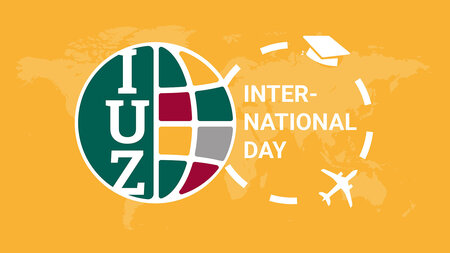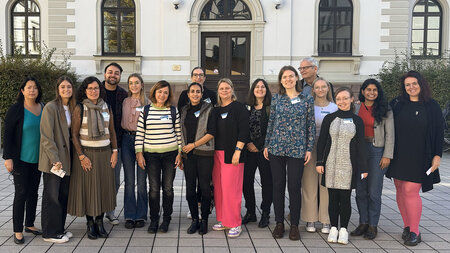A New Academic Home – 25 Years Later
Maryse Nsangou-Njikam, since September Cultural Counsellor at the Cameroon Embassy in Berlin and a scholar from Yaoundé University, visits the English Department to join discussions on PhD projects
Last Friday, Maryse Nsangou-Njikam from the University of Yaoundé visited the English Department at Chemnitz for the first time. She knew of the good cooperation through two PhD thesis 10 years ago and two Alexander-von-Humboldt (AvH) scholars from Yaoundé since 2008 and 2013. At the station, she confessed that it was not her first visit to the city, however. Over 25 years ago, she had used the opportunity to visit a friend in computer science in Karl-Marx-Stadt immediately when the wall had come down, since she studied German in Bielefeld then. She could hardly recognize the university and the city again, since she remembered it only as very, very grey, but friendly and dynamic. In 2000, she completed her PhD at Saarbrücken and now she took the opportunity to strengthen the cooperation, which she knew from an AvH network conference in Yaoundé in 2015 and several joint publications with and by Prof. Nkemleke in the REAL series (Research in English and Applied Linguistics). She had arrived in Berlin to take up her new post in September and was keen to participate in the Chemnitz Africa/Asia Symposium on English (CASE), where doctoral students discuss their PhD projects.
This time, Adeiza Isiaka’s from Cameroon’s neighbour country Nigeria showed that he has almost finished his thesis in socio-phonetics, where he had analysed more than 25,000 pronunciation tokens from his own sociolinguistic recordings to answer the old question how many vowels Nigerian varieties have today – a similar study from Cameroon could produce different results, Prof. Nsangou-Njikam hypothesised, although her specialisation is in psycholinguistics. Similarly, Zeenat Sumra, a Chemnitz PhD student from Dar es Salaam, presented her materials on code-switching in the (at least) trilingual Indian communities in Tanzania – and the situation is dramatically different in the (officially) bilingual communities in Cameroon. Finally, Gua Ya from China had a “dress rehearsal” to prepare for a conference in Shanghai this December. Her study on clause complexity in Chinese MA theses could find a parallel in Cameroon, if the database there could be expanded. This may easily be possible since the first BA thesis by a Chemnitz student will be handed in next month, which is also based on extensive fieldwork. Even students who did not give a paper this time at the symposium could benefit from the African vistor’s topic-specific and detailed questions, helpful suggestions and encouraging feedback.
Maryse Nsangou-Njikam was impressed by the engaging academic atmosphere and praised all speakers and discussants. She even promised to come back to Chemnitz next summer at the latest for the next "Heizhaus conference" to present some of her own work as a linguist or to meet more Cameroon students in her function as a counsellor at the Embassy. She was happy to have come back and to have found a new academic home in Chemnitz so many years after her first visit.
For more information, visit: https://www.tu-chemnitz.de/phil/english/sections/ling/CAfrSymposium.php
(Authors: Josef Schmied and Jessica Dheskali)
Mario Steinebach
21.11.2016






